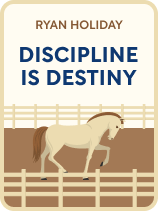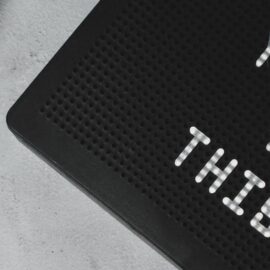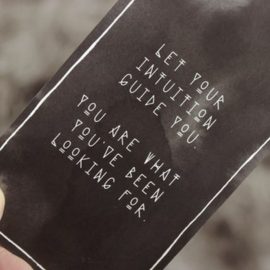

This article is an excerpt from the Shortform book guide to "Discipline Is Destiny" by Ryan Holiday. Shortform has the world's best summaries and analyses of books you should be reading.
Like this article? Sign up for a free trial here.
How do you build self-discipline in a way that sticks? Why do you need to have a purpose to have control?
In Discipline Is Destiny, Ryan Holiday discusses why identifying your purpose is essential to practicing discipline. He also says that you can fulfill your purpose by being disciplined, while also facing any hardships you encounter.
Keep reading to learn how to build self-discipline so you can be successful in life.
Strategy #1: Identify Your Purpose
Holiday argues that to learn how to build self-discipline, you must first identify your purpose. Discipline requires that you work consistently toward a purpose and avoid temptations that distract you from that purpose. This is impossible if you don’t know what your purpose is. Holiday describes purpose as work that is inherently enjoyable and not something you do in pursuit of external rewards. Truly loving your work is what will allow you to keep doing it despite the many challenges you may face—because while doing the work is hard, not doing this work is unimaginable.
(Shortform note: Holiday’s definition of purpose has similarities to the Japanese concept of ikigai. In their book Ikigai, authors Héctor García and Francesc Miralles explain that ikigai is a person’s reason for existing or life purpose. Your ikigai keeps you going in life, and you pursue it throughout your whole life—not just when you’re getting paid for it—despite any setbacks you may face. However, unlike Holiday’s idea of purpose, you can have more than one ikigai. To find yours, ask yourself what activities you enjoy so much that they make you forget about everything else, including your worries and the passage of time. The answer to this question points toward your ikigai.)
Strategy #2: Set the Stage
Once you identify your purpose, you must set the stage to tackle it by preparing your body and environment.
Holiday asserts that taking care of your body ensures you’re healthy enough to pursue your purpose. So eat a healthy diet, exercise regularly, and rest adequately. Eating well supports your health and lets you practice resisting temptation. Exercising regularly and pushing through physical challenges fortifies your ability to push through mental challenges. Getting enough rest provides your body with a chance to restore itself; working excessively to the point of ignoring your body’s needs is not discipline and will likely backfire eventually. And sleeping well improves your ability to make hard decisions.
(Shortform note: In High Performance Habits, Brendon Burchard agrees that maintaining your health is essential to pursuing your purpose. But while Holiday speaks of maintaining your health in general, Burchard argues that different habits support different areas of health—physical, mental, and emotional—and thus provide different benefits. Eating well, exercising regularly, and getting adequate rest improve your physical health and as such give you energy and mental clarity, and release brain chemicals that help with emotional management. Good mental health enables you to pace yourself, which helps you stay on-task, while good emotional health helps you relate to others and effectively handle stress.)
Holiday also recommends that you straighten up your workspace and your appearance—both of which also set the stage for you to tackle your purpose. He argues that organizing your workspace frees up the mental energy you need to focus on your purpose and reduces the feeling of overwhelm by the massive amounts of information you encounter in your daily life—whether in emails or physical clutter. (Shortform note: Having an organized workspace may not improve your ability to work if your problem is not that you’re overwhelmed or tired but that you can’t be creative. Some studies suggest that being in a messy environment improves creativity.)
Similarly, straightening up your appearance puts you in a better mindset to work than being unkempt. Moreover, your appearance affects how positively others perceive you and whether they want to work with you. While excessively focusing on fashion is undesirable, dressing well may allow you to connect with people who are essential to your work.
(Shortform note: Scientists agree that your clothing affects your self-perception, which changes how you work—a theory known as “enclothed cognition.” Notably, it’s not just what you wear, but how you perceive what you wear that affects how you see yourself and how you work. In the 2012 study that introduced the term enclothed cognition, students were recruited to wear white lab coats. The students who were told that these were “medical doctor’s coats” were more able to sustain their attention than those who were told that they were “artistic painter’s coats.” This indicates that it was the value the students assigned to the lab coats—not the lab coats themselves—that affected the students’ focus.)
Strategy #3: Fulfill Your Purpose
Practicing discipline doesn’t just help you identify your purpose and prepare you to tackle it; it also helps you fulfill that purpose by leading you to prioritize your purpose and behave appropriately when you’re working toward it.
Holiday explains that when you’re disciplined, you prioritize your purpose by regularly refusing potential opportunities that would divert your attention from what matters most. Set clear limits regarding what you’re willing to do and with whom you’re willing to speak, and avoid people who try to cross those limits. But don’t try to do it all yourself: Willingly accept or pay for any help that buys you time to reflect on whether you’re doing what’s most important and to actually do that work.
Prioritizing your purpose also requires that you design your schedule around your purpose. Wake up early so that you can focus on the most important work. Doing what matters first not only ensures that you’re not distracted by others’ demands (since they’ll still be asleep), it also ensures that you actually do the thing you want to do instead of procrastinating—and potentially never getting around to doing it. Once you set this schedule, stick to it every day—even on the days when it’s difficult to do so. Most people struggle to remain consistent. So if you can master consistency, you’ll steadily improve—and ultimately, grow more than those who don’t do it every day.
Strategy #4: Deal With Hard Times
As you go through life, you’ll inevitably encounter hardship. However, Holiday asserts that practicing discipline can help you deal with three types of hardship: pain, negativity, and failure.
- Deal With Pain. To deal with pain, Holiday asserts that you must practice discipline by learning to tolerate pain. You must fight through your hardships (which are inevitable) if you want to have any chance of success.
- Deal With Negativity. To deal with negativity, Holiday asserts that you must practice discipline by resisting the urge to fight back. If someone behaves poorly toward you, you may understandably want to fight against them or defend yourself.
- Deal With Failure. Holiday asserts that dealing with failure in a disciplined manner requires that you learn to handle it with grace. In general, don’t treat failure as an excuse to stop; remain persistent and pursue your goals despite the failure.

———End of Preview———
Like what you just read? Read the rest of the world's best book summary and analysis of Ryan Holiday's "Discipline Is Destiny" at Shortform.
Here's what you'll find in our full Discipline Is Destiny summary:
- Why your ability to practice discipline determines how successful you are
- How to practice discipline throughout various stages of your life
- Why the greatest enemy to discipline is your ego






